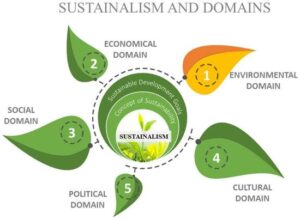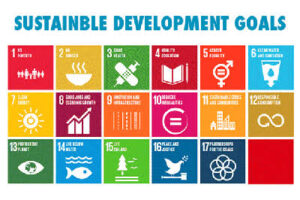Back to: Environmental Biology 100 Level
Welcome to class!
Hello amazing learner! Today’s topic is very important because it focuses on how we can meet human needs without destroying the planet for future generations. Our lesson is Sustainable Development and Environmental Policies. By the end of this session, you’ll understand what sustainable development means, why it is important, and the role of environmental policies in achieving it.
Sustainable Development And Environmental Policies
Have you ever thought about what will happen if we cut down all the forests, pollute all rivers, and use up all the oil? Future generations would suffer greatly. That’s why the world now focuses on sustainable development—using resources wisely so they last for everyone, both now and in the future.

What is Sustainable Development?
Sustainable development means meeting the needs of the present without compromising the ability of future generations to meet their own needs. It combines economic growth, social well-being, and environmental protection.
Key Principles of Sustainable Development:
Efficient Use of Resources: Avoid waste and use renewable resources like solar energy.
Environmental Protection: Preserve forests, wildlife, and clean water.
Equity and Fairness: Resources should be shared fairly among people and nations.
Examples in Nigeria:
Using solar energy in rural communities.
Sustainable agriculture like crop rotation and organic farming.
Why is Sustainable Development Important?
Prevents resource depletion.
Reduces pollution and climate change.
Ensures food, water, and energy security.

Improves quality of life for present and future generations.
What are Environmental Policies?
Environmental policies are rules and laws made by governments and organisations to protect the environment. These policies guide how natural resources should be used and managed.
Examples of Environmental Policies and Laws:
Nigeria’s National Environmental Standards and Regulations Enforcement Agency (NESREA): Ensures industries control pollution.
Environmental Impact Assessment (EIA): Any major project must assess its impact on the environment before starting.
Forestry Laws: Prevent illegal logging and promote reforestation.
International Agreements:
Paris Agreement: Countries work together to reduce greenhouse gas emissions.
Convention on Biological Diversity: Protects biodiversity globally.
How Can We Promote Sustainable Development?
Plant trees and support afforestation.
Reduce waste through recycling.
Use clean energy sources like solar and wind.

Support government policies on environmental protection.
Educate people about environmental care.
Summary
Sustainable development is using resources wisely to meet current needs without harming the future. Environmental policies, both national and international, are essential in guiding activities that protect our planet. Together, they ensure a balance between development and environmental health.
Evaluation
- What is sustainable development?
- Mention two environmental policies in Nigeria.
- Give two reasons why sustainable development is important.
Well done, superstar! By understanding sustainable development and environmental policies, you are part of the movement to protect our planet for generations to come. Keep learning with Afrilearn—your knowledge will change the world!
